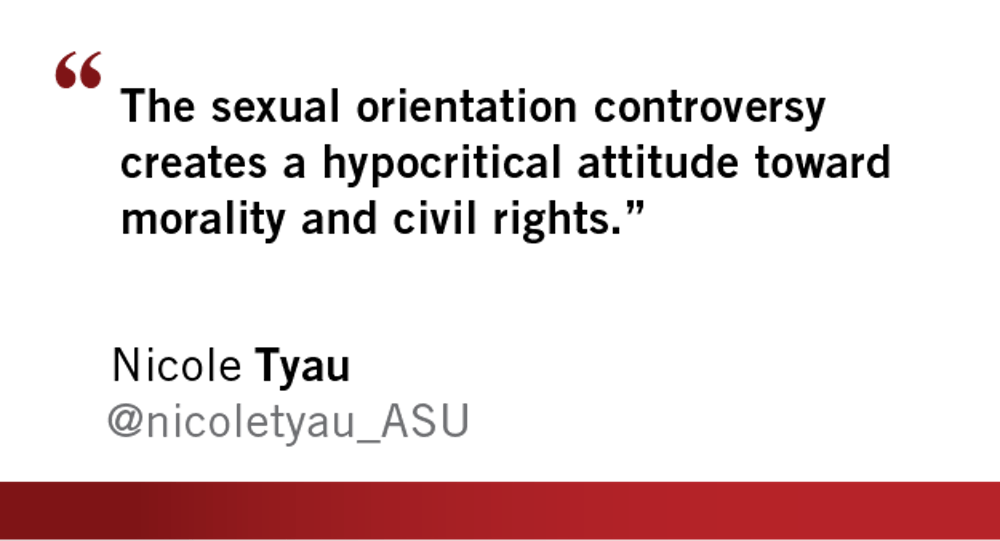The American Civil Liberties Union defines religious discrimination in part as "bridal salons, photo studios, and reception halls closing their doors to same-sex couples planning their weddings." Recently, though, this definition has been used to apply to bakeries.
Corporations' and businesses' religious rights became a contentious topic when many businesses in several states refused to serve members of the LGBTQ community because of their sexual orientation. Arizona’s Senate Bill 1062 made headlines across the nation when the state Legislature approved a measure later vetoed by Gov. Jan Brewer allowing businesses to "(refuse) to act in a manner substantially motivated by a religious belief."
Most recently, a Colorado baker came into the spotlight after she was served with a civil rights complaint for not putting homophobic images and phrases on cakes for a customer; some believe she was right, while others say it’s just as bad as the reverse situation.
The aforementioned Colorado baker is Marjorie Silva, owner of the Azucar Bakery in Denver. In her case, she explains that she did not flat-out refuse to serve Bill Jack, founder of Worldview Academy and the complainant in this case. Rather, Silva argues that she offered to bake the cakes and supply him with the tools to write the messages himself.
In a Washington Post article about this case, Nancy Leong, a University of Denver law professor, argues that because Silva did not directly refuse service, a civil rights complaint against her is unwarranted.
“She offered to accommodate him to the extent that she could,” Leong said. “In fact, requiring her to write that message would infringe on her own free speech rights.”
On my first read-through of this case, I saw a direct parallel to the Masterpiece Bakery in Lakewood that refused to make a wedding cake for a gay couple — the case that was frequently associated with SB 1062. I begrudgingly told myself that Silva was wrong and had discriminated against someone for their religious beliefs.
Leong's statement, though, has changed my mind.
There is a distinct difference between refusing to serve because of discrimination and refusing to comply because of free speech violations. If a business tells a homosexual couple that they will not serve them because they are homosexual, then the business is discriminating. However, in Silva's case, she tried to accommodate the customer as well as she could without abandoning her civil rights.
Whether or not Silva's case is one of discrimination or free speech, the situation reversal has brought up a new question within this debate: Can we pick and choose who the law affects based on moral beliefs?
I believe the answer to this question would be a resounding and vehement "no." The law already says that a corporation is a person, which is why we can sue them and buy stock. Hobby Lobby is a common example of citing religious freedom when it refused to provide its female employees with contraception under Obamacare.
As much as I disagree with their stance, I cite Voltaire's "I do not agree with what you have to say, but I'll defend to the death your right to say it."
It is often forgotten that as much as a customer has civil rights, so does the person behind the business. If our laws tell us that a person should be able to refuse service based on religious freedoms and civil rights, then that belief applies in situations we disagree with morally. Though it doesn't always feel this way, there is a difference between what is right and what we believe is right, and we can't simply pick and choose when we want it to be right under the law.
Reach the columnist at nicole.tyau@asu.edu or follow @nicoletyau_ASU on Twitter.
Editor’s note: The opinions presented in this column are the author’s and do not imply any endorsement from The State Press or its editors.
Want to join the conversation? Send an email to opiniondesk.statepress@gmail.com. Keep letters under 300 words and be sure to include your university affiliation. Anonymity will not be granted.
Like The State Press on Facebook and follow @statepress on Twitter.





